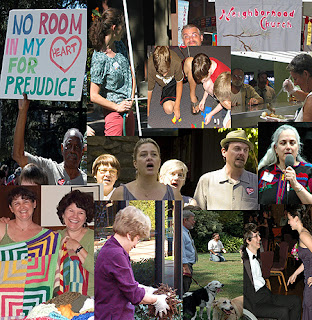 I find the many connections between people within our congregations and within our denomination create tendrils of affection and interest that intertwine and bind us tightly together. Our tradition honors two truths in particular. We profoundly honor the preciousness of the individual. This cannot be overstated. And our churches cultivate a broader engagement with the world informed by a profound intuition of our radical interdependence with each other and the world itself. Within this creative tension of knowing we are precious and unique as individuals and at the same time we are tightly bound together; we come together in our congregations and create what our spiritual ancestors called the “gathered community.” As such a Unitarian Universalist congregation serves as a symbol of possibility for individuals and communities for healing and justice in this world.
I find the many connections between people within our congregations and within our denomination create tendrils of affection and interest that intertwine and bind us tightly together. Our tradition honors two truths in particular. We profoundly honor the preciousness of the individual. This cannot be overstated. And our churches cultivate a broader engagement with the world informed by a profound intuition of our radical interdependence with each other and the world itself. Within this creative tension of knowing we are precious and unique as individuals and at the same time we are tightly bound together; we come together in our congregations and create what our spiritual ancestors called the “gathered community.” As such a Unitarian Universalist congregation serves as a symbol of possibility for individuals and communities for healing and justice in this world.
I find a living and vital UU congregation is filled with the sounds of life—joy, sadness, triumph and frustration. To be faithful to our vision we can’t turn away from any part of this. Because what we are about is the sharing of our lives, fully.
It is obvious to even the most casual observer that our liberal churches aren’t held together by dogma. Rather, our covenant of presence to each other and the world, our willingness to be together without veil or artifice, allows us to share a genuine experience of love, perhaps the most mysterious and compelling force in the universe. Small wonder those who experience such love are tempted to name it God. Whatever name we give it, this love we encounter in our authentic presence to each other and the world is transformative.
Sometimes we can enrich the celebration of our joy by coming together, and sometimes we can help each other in our sadness or brokenness in that coming together. Sometimes all we can do is be together, without being able to do any “thing” at all. Even this turns out to be healing. This simple presence, this gathering together, is the genuine substance of our congregations. In that togetherness we incarnate true community—the church, in the language of our direct spiritual ancestors, what we might best call a house of prayer for all peoples.
The congregation is so much more than a building and some people who come together on a Sunday – or occasionally during the week. As I’ve already suggested, individuals are the beating heart of our community. But, a religious congregation is anchored in a past beyond individual lives and extends toward a future beyond our individual dreams. Our elders are our engaged memory. Our children are our living hope. Our active members bring our memory and hope together into the living present.
In our tradition the minister is called by the congregation to serve as a professional and spiritual leader. The minister’s authority derives from that gathered community which she or he serves, and has many functions; providing spiritual focus for the community, preaching, teaching, counseling, and much more. But ultimately we need to remember that as a religious people we are all engaged in this great work together. The call to minister, our call to service, is mutual. We’re all, very much, in this together.
As the great Unitarian divine A. Powell Davies observed, “None of our private worlds is big enough for us to live a wholesome life. We need the wider world of joy and wonder, of purpose and venture, of toil and tears. What are we, any of us, but strangers and sojourners forlornly wandering through the nighttime, until we draw together and find the meaning of our lives in one another, dissolving our fears in each other’s courage, making music together, and lighting torches to guide us through the dark? We belong together. Love is what we need. To love and to be loved.”
I believe we are all called to find the wisdom hidden in our memories and hopes, our joys and sorrows. When we come together in a spiritual community we are called to remember, to re-member, to rejoin, to return to our truest selves. By working and playing together, by not being afraid to ask both the whimsical and hard questions, by coming together, we can make our lives something like that famous mustard bush, with its great branch giving shade for the birds of heaven. I believe this is the work of our gathered community.












